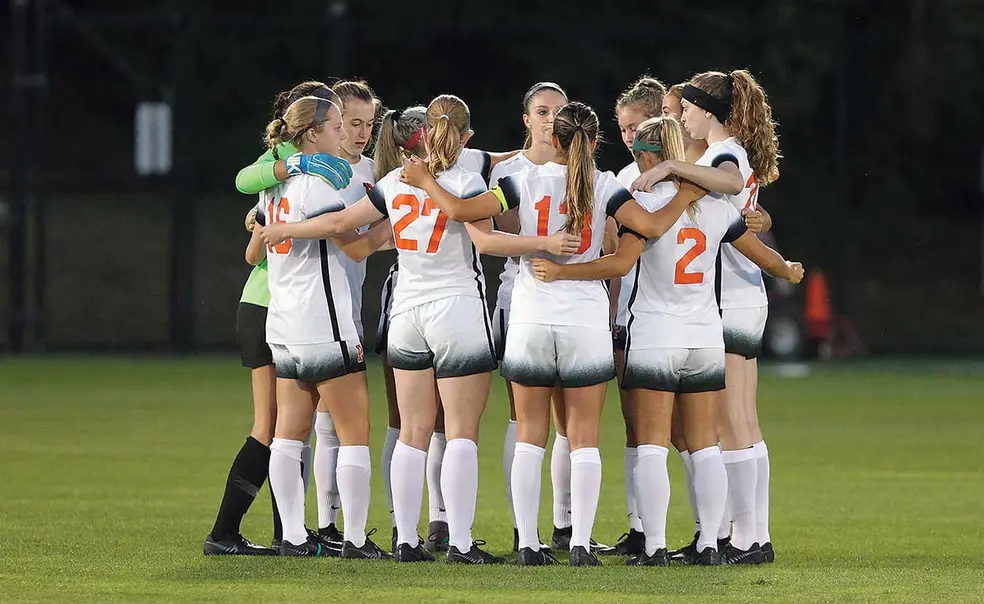Athletics: Benched by COVID
Coaches and student-athletes head into a fall without athletic competition
Seven hundred Princeton student-athletes tuned in to a July 8 webinar to hear the verdict: The Ivy League had canceled all fall intercollegiate competition because of the coronavirus pandemic.
Caroline Noonan ’22, a starter the last two seasons for women’s soccer, was among them.
“I kind of expected it, but hearing it was so painful,” she said. “I almost couldn’t find any emotion within myself to cry.”
Director of Athletics Mollie Marcoux Samaan ’91 quickly began assuaging fears. “We always talk about our values in everything we do, and this is no different,” she said. “If our top priority is education through athletics, we still can do a lot of educating through this experience, through our coaches and through our administration and through our performance team.”
The University also committed to keeping all its varsity teams, even as Dartmouth, Brown, and Stanford made headlines for cutting several of theirs.
Princeton’s coaches have stood behind the fall decision while acknowledging its impact on the athletes who make up almost 20 percent of the undergraduate student body.
“They’re going to miss out on the competition and camaraderie,” said women’s volleyball head coach Sabrina King ’01. “They’re not coming to Princeton necessarily for athletics, but it’s a huge part of their identity. That hyphen between student-athlete, that’s a whole holistic piece of what they’re doing.”
On Aug. 7 came the additional change from President Eisgruber ’83 not to allow first-years and juniors back in September after all. Now every class is in the same boat.
Noonan had been planning to return to campus in the fall and hoped for some small-group training. But with the latest announcement she scrambled to explore living off-campus with teammates.
“At least we would have people to be with, to go on runs with,” she said. “Now, we’re so isolated.”
Over the summer, Princeton teams stayed in closer contact than usual. Questions emerged about enrollment, future eligibility, playing with club teams outside Princeton, and the potential for taking a leave of absence. No deadlines are in place to determine if the fall sports seasons will be postponed until the spring or canceled altogether, and winter sports that span both semesters are up in the air.
“The student-athletes are struggling,” said women’s swimming head coach Bret Lundgaard. “These are kids who know what they’re doing, they’ve checked the boxes for many years of their life, and right now they don’t know what to check.”
“They’re not coming to Princeton necessarily for athletics, but it’s a huge part of their identity.” — Women’s volleyball head coach Sabrina King ’01
Sam Ellis ’21, who spent two months living in Boulder, Colorado, with several men’s cross country and track and field teammates, applied for a leave of absence when school went fully remote. He wants to compete for Princeton again, but also said he benefits more from in-person learning. He has an eye on the Olympic Trials in June 2021; he broke Princeton’s 29-year-old indoor mile record in February.
“I feel like I have unfinished business on the track, things I want to do in a Princeton uniform, and I know I won’t be able to do that this year,” he said.
Coaches said they’ve been focused on keeping their student-athletes engaged physically, mentally, and emotionally. Virtual meetings are helping teams stay connected, and athletes will continue to receive training plans from Princeton this fall.
Men’s basketball head coach Mitch Henderson ’98 was emotional when he saw some players who came to campus July 12 for a Black Lives Matter march. It was the first time he had been with them in four months.
“So much of what we are, in our program and all the sports, is the camaraderie of being together and the way we make each other better by being around each other,” Henderson said. “So that’s a challenge. The team Zoom calls have been good. They’re not as good as the real thing, but they’re good.”
Women’s basketball head coach Carla Berube said her group’s discussions this summer have ranged beyond sports to what’s going on in the world, addressing racism, and talking about how best to support Black student-athletes and teammates. “It’s all been very positive, and we’ve learned a lot more about each other,” she said.
Women’s volleyball players have held virtual game nights and discussed career development with alumnae. Men’s basketball has been growing its community service initiatives, connecting with the Trenton Boys and Girls Club and looking into book drives. And men’s soccer organized a mentoring program that matched alumni with players.
“We’re focusing on the positives,” said men’s soccer head coach Jim Barlow ’91. “It has given us all time to reflect on what’s important and think about the things we’re lucky to have. From that standpoint, maybe it’ll bring the team closer together in the long run.”












No responses yet